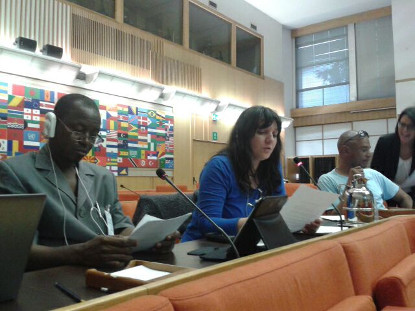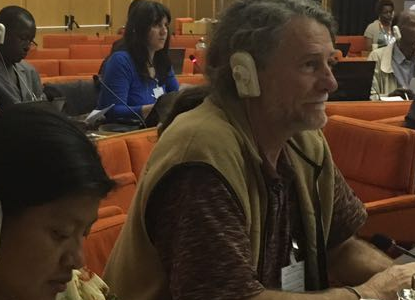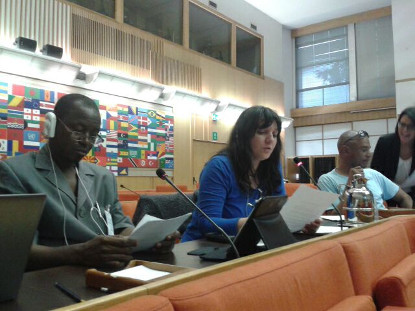 At the CFS negotiations on Connecting Small Holders to Markets, being held in Rome on the 8th and 9th of June 2016, Ramona Duminicioiu, Angel Strappazon and Javier Sanchez were among the speakers who intervened through the two days. Below is the full text of Ramona and Angel’s interventions.
At the CFS negotiations on Connecting Small Holders to Markets, being held in Rome on the 8th and 9th of June 2016, Ramona Duminicioiu, Angel Strappazon and Javier Sanchez were among the speakers who intervened through the two days. Below is the full text of Ramona and Angel’s interventions.
Ramona Duminicioiu from Eco Ruralis/ECVC, Roumania intervened on the CFS Open-Ended Working Group on markets linked to local, national and/or regional food systems:
Globally more than 80% of smallholders operate in local and domestic food markets, with the majority trading through informal means. These highly diverse markets are the ones through which most of the food consumed in the world transits. They operate within territorial spaces that can range from local to transboundary to regional and may be located in rural, peri-urban or urban contexts.
They are directly linked to local, national and/or regional food systems: the food concerned is produced, processed, traded and consumed within a given space and the value added is retained and shared there, helping to create employment. They can take place in structured arrangements or in more ad-hoc or informal ways which provide greater flexibility for smallholders and fewer barriers to entry and more control over prices and market conditions. They perform multiple functions beyond commodity exchange, acting as space for social interaction and exchange of knowledge. They are highly inclusive of and accessible to smallholders and other categories of food insecure, especially women, by this means contributing to the fulfilment of their human right to food. Despite their importance, informal markets are often overlooked in data collection systems which impacts negatively on the evidence base for informing public policies. As women smallholders mostly operate in informal markets, their essential contribution to food systems, including food distribution, and economic growth remains largely invisible in trade and development policy-making processes and, they face particular socio-economic barriers in accessing resources and marketing opportunities resulting in further marginalization and violation of their rights. Given their importance for food security and smallholder livelihoods, public policies and investments should be oriented towards strengthening, expanding and protecting territorial markets.
Regarding political recommendations, we would request the collection comprehensive data on local, domestic and informal – both rural and urban – markets linked to territories to improve the evidence base for policies, including sex-disaggregated data, and incorporating this as a regular aspect of national and international data collection systems.
We also recommend transparent pricing of agricultural products that provides full remuneration for smallholders’ work and their own investments, including rural women. Pricing policies should give smallholders access to timely and affordable market information to enable them to make informed decisions on what, when and where to sell, guarding against the abuse of buyer power, particularly in concentrated markets.
Angel Strappazon, from CLOC-VC, Argentina, intervened in defense of institutional procurement programs:
 Thank you for the efforts we all make for the good of small producers and also for the good of consumers and of our peoples. Regarding the recommendations related to institutional procurement, we propose the identification of opportunities for smallholders to rely on regular and stable demand for agricultural products and for consumers to access healthy, nutritious, diverse, fresh and locally produced food, including during crises and conflicts.
Thank you for the efforts we all make for the good of small producers and also for the good of consumers and of our peoples. Regarding the recommendations related to institutional procurement, we propose the identification of opportunities for smallholders to rely on regular and stable demand for agricultural products and for consumers to access healthy, nutritious, diverse, fresh and locally produced food, including during crises and conflicts.
Secondly, we request the promotion of institutional procurement programmes for public institutions such as schools, hospitals, prisons, homes for the elderly and public servants’ canteens, by providing food produced by smallholders through participatory mechanisms involving them in the process.
Finally, we would like to recommend the improvement of procurement procedures –not in collaboration with smallholders and their organisations, with adapted modalities, which include simplified language, waiving of performance bonds, fast, regular and advance payments and manageable quantities and time frames.
Intervention by Javier Sanchez, from COAG/ECVC, Spain, is already published here.

